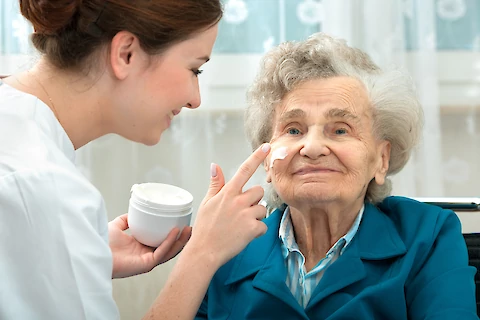
As our loved ones age, taking proper care of their skin becomes increasingly important. Seniors face a higher risk of developing skin cancer, or melanoma, and experiencing skin sensitivity. This makes it very important for family members and caregivers to be well-informed on senior skin care.
Senior Helpers Wilmington has what you need to know about various skin-related risks seniors face, as well as how to protect their skin throughout the seasons.
The Increased Risk of Skin Cancer in Seniors
Sun exposure plays a significant role in the development of skin cancer. The cumulative effect of sunlight throughout a person's lifetime also puts seniors at a higher risk. The most common types of skin cancer that affect seniors include basal cell carcinoma, squamous cell carcinoma, and melanoma. Regular skin checks and protection from the sun are essential in reducing the risk of skin cancer in senior adults.
Melanoma Risk in Seniors
Melanoma is a dangerous form of skin cancer that forms in the cells responsible for skin pigmentation. It spreads quickly and can be life-threatening if not detected and treated early.
Seniors are at a higher risk of developing melanoma due to several factors. These include weakened immune systems, a lifetime of sun exposure, and a decreased ability for the skin to repair itself. Additionally, early detection through regular skin checks and preventative measures can help reduce the risk of melanoma in seniors. These include using sunscreen and wearing protective clothing.
Skin Sensitivity in Seniors
As we age, our skin undergoes various changes in structure and function which can lead to increased sensitivity. Seniors often experience dryness, itching, and bruising due to thinning skin and a decrease in the production of natural oils. Regular moisturization, gentle cleansing, and avoiding harsh skincare products can help maintain healthy skin in seniors and alleviate discomfort caused by common skin conditions.
Seasonal Skin Care Tips for Seniors
- Summer: During the warmer months, seniors should take extra care to protect their skin from the sun's harmful rays. Encourage the use of broad-spectrum sunscreen with an SPF of 30 or higher, wear protective clothing, and stay hydrated to maintain healthy skin.
- Fall: As the temperature drops, seniors should focus on maintaining skin moisture by using gentle cleansers and applying a rich moisturizer. Address any seasonal skin issues, such as eczema or psoriasis flare-ups, promptly with the guidance of a dermatologist.
- Winter: Cold temperatures and dry indoor air can wreak havoc on seniors' sensitive skin. To protect against these harsh conditions, use a humidifier to maintain indoor moisture levels, apply moisturizers regularly, and dress in layers to regulate body temperature.
- Spring: Allergies and skin sensitivities can be particularly problematic during the spring season. Help seniors manage these issues by using hypoallergenic skin care products and consulting a dermatologist for the best course of action.
Senior Helpers Offers Senior Skincare Support
Caring for the skin of our senior loved ones is a vital aspect of ensuring their overall health and well-being. By understanding the increased risks they face, such as skin cancer and sensitivity, we can take the necessary steps to protect and maintain their skin throughout the years. If you live in New Hanover, Pender, Brunswick, or Wilmington and need assistance with senior care, contact Senior Helpers Wilmington for professional and compassionate help.